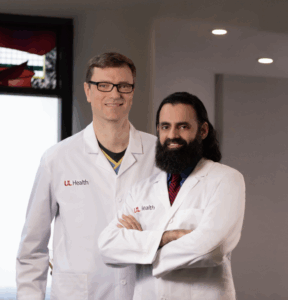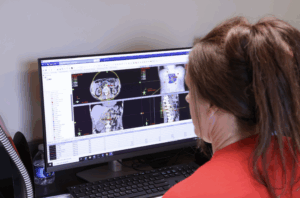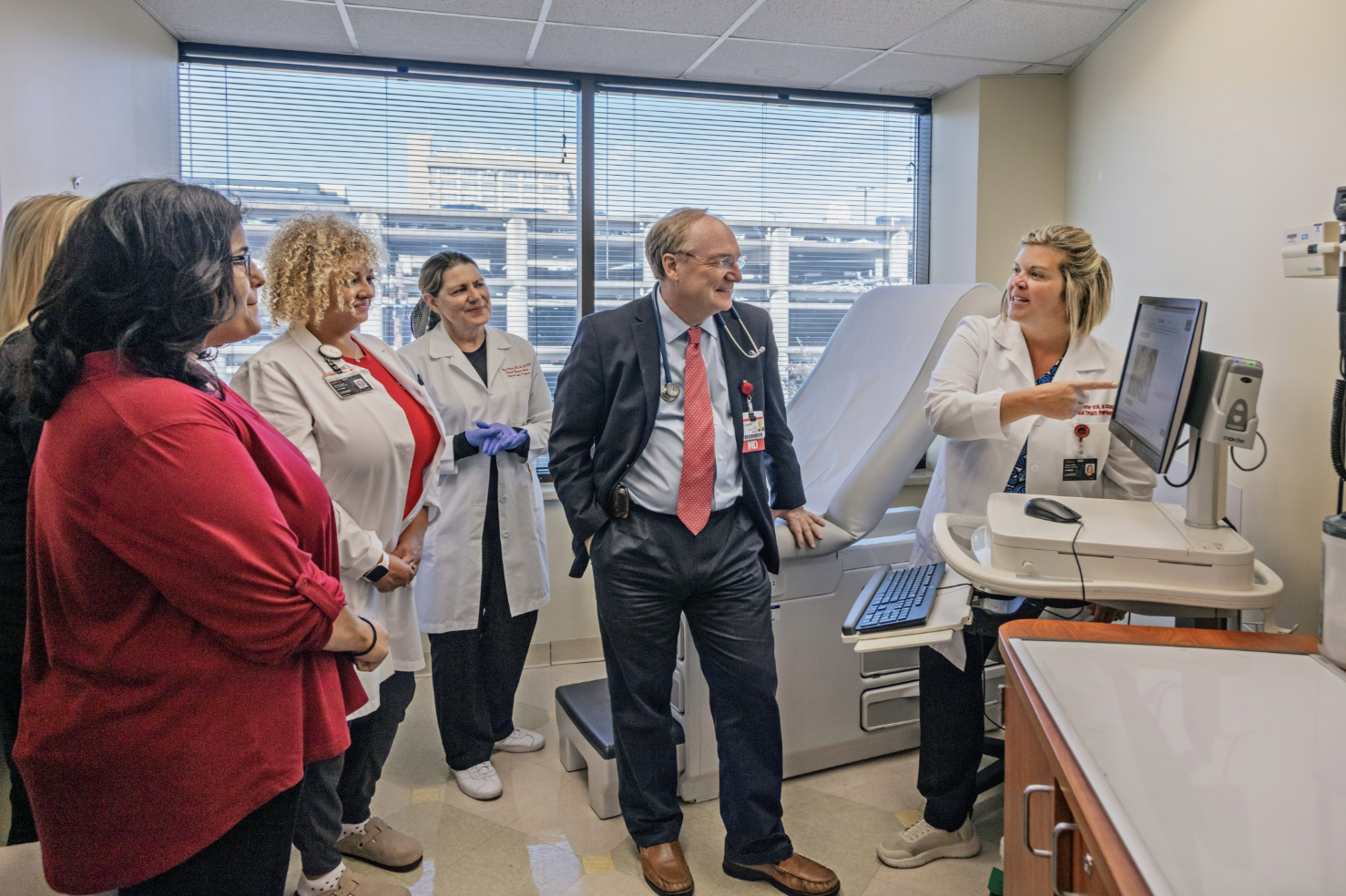UofL Health Surgeon Advocates for Early Lung Cancer Screenings & Improved Access
 November brings heightened awareness for one of the deadliest forms of illnesses in the United States: lung cancer.
November brings heightened awareness for one of the deadliest forms of illnesses in the United States: lung cancer.
Lung cancer is the leading cause of cancer deaths worldwide, with nearly 160,000 patients dying each year, more than from prostate, breast and pancreatic cancers combined. Dr. Victor H. van Berkel, M.D., Ph.D, the division chief of thoracic surgery at UofL Health and surgeon for the lung cancer team at UofL Health – Brown Cancer Center, says the main reason lung cancer can be so deadly is the lack of early symptoms that develop within patients.
“People with early-stage lung cancer don’t know they have it,” van Berkel says. “They don’t have any pain or a cough or anything that lets them know. Unfortunately, a lot of times we find out when it’s too late.”
Kentucky has the highest incidence rate of lung cancer in the United States, with about 90% of lung cancers caused by smoking. But there is good news. Getting screened for lung cancer can help detect before symptoms ever develop and when the cancer is more treatable and possibly curable. The U.S. Preventive Task Force recommends yearly lung cancer screenings to anyone who has a history of heavy smoking and is between 50 and 80 years old. Most insurances cover the screenings in that age range even for former smokers who quit
within the last 15 years and smoked more than 20-pack years.
“There’s a big push to let people know about lung cancer and to get more screenings,” van Berkel says. “Lung cancer screenings are simple. It’s a CT scan where we take a look at your lungs to see if you have anything that isn’t supposed to be there. About 60% of people who should get scanned for colonoscopies do it. When you look at lung cancer, it’s somewhere around 8-10% who actually get screened. That’s a huge problem because of the amount of people who still smoke. If we can get all the people who are smoking to get screen, we would find a lot of these cancers at a much earlier stage and we can fix those people. If you have a Stage One lung cancer, I go in and cut it out and most people do great.”
 Lung cancer isn’t just a career choice for van Berkel. His father died from lung cancer after years of heavy smoking, which has reinforced van Berkel’s research to improve screening percentages and understanding of how hard it is to quit smoking.
Lung cancer isn’t just a career choice for van Berkel. His father died from lung cancer after years of heavy smoking, which has reinforced van Berkel’s research to improve screening percentages and understanding of how hard it is to quit smoking.
“I had been yelling at my dad for years and years to quit smoking,” van Berkel says. “I appreciate when people tell me how hard it is to quit smoking, I don’t begrudge them for that. I do a lot of research that focuses on trying to improve lung cancer screening. Coming up with other ways to identify the cancer at an earlier stage because I know how important it is. I know if we had lung cancer guidelines, we might have known about my dad much earlier and been able to do something before he got so sick.”
It’s not just smokers who are at risk of lung cancer. Exposure to radon can increase chances for lung cancer, as can second-hand smoke, either at home or by working in an environment where others are smoking. Between 60 and 65% of all new lung cancer diagnoses are among people who have never smoked or are former smokers.
“Even really healthy people can get lung cancer,” van Berkel says. “The biggest demographic of people who get cancer but don’t smoke is middle aged women. It can happen to anyone. Obviously, people who smoke are at the highest risk and that’s who we focus on, but there’s an increasing number of people who don’t smoke who are getting lung cancer as well. It’s something for all people to think about.”
No matter what stage of lung cancer a patient has, UofL Health is committed to helping. While previously thought of as a death sentence, treatments for even the most severe cases have improved over time, giving more options on how to move forward. Earlier detection can increase the chance of survival by 50%.
“There are people who are afraid of what this diagnosis would mean for them, but if we can make a diagnosis early, we have a ton of options on how we can treat,” van Berkel says. “There are many more options than we had even five years ago. It used to just be chemotherapy and radiation but with the advent of immunotherapy, which has come on in the last few years, the survival of lung cancer is much better. A lot of people thought for a long time, and understandably based on the outcome, that lung cancer is a death sentence. Now we have a much better array of tools to treat people. Not just to give them a longer life, but a higher quality of life with the treatments. The tools we have are much better than they used to be.”
To determine eligibility for low-dose CT lung cancer screenings, patients can call the Brown Cancer Center’s Lung Screening Program at 502-210-4497. Screenings are available at many UofL Health facilities throughout the Louisville area, including Medical Center East on Dutchman’s Lane and Medical Center Northeast on Terra Crossing Blvd.
“The approval of lung cancer screenings started in 2016 and since that time, it’s very slowly made improvements in who is getting scanned,” van Berkel adds. “It’s like telling people cigarettes are bad – people think they will get to that and they don’t take care of themselves. I feel like we are making progress slowly but we need to make more progress. It’s not invasive. Just a CT scan. For anyone who has had a CT scan, you just lay in a tube. They don’t have to stick you with anything. The main thing that is holding people back, some of it is convenience. There’s also a component of people who smoke of not wanting to know.”
The UofL Health team is also hopeful to make it easier for people to get screened, especially in rural communities.
“We always have a booth at the Kentucky State Fair,” van Berkel says. “We have campaigns encouraging people to talk to their primary care physician about getting screened. We’re trying to build a truck that has a CT scan unit in it so we can go to more rural communities where people don’t have access to screening places. That’s something we’re hopefully going to have up and running within a year and is all in an effort to increase the screening percentages.”
Overall, van Berkel is pleased to see an increase on the emphasis and importance of lung cancer screenings, but wants all potential patients to know he is dedicated to helping them get better.
“A lot of people who smoke think they did it to themselves,” van Berkel says. “They think they deserve it, which is crazy, no one deserves cancer. I don’t care if you smoke, we’re going to try and get you healthy. I do think there’s a component of that with lung cancer is you deserve it, and that’s not true. Everyone deserves to be taken care of.”





